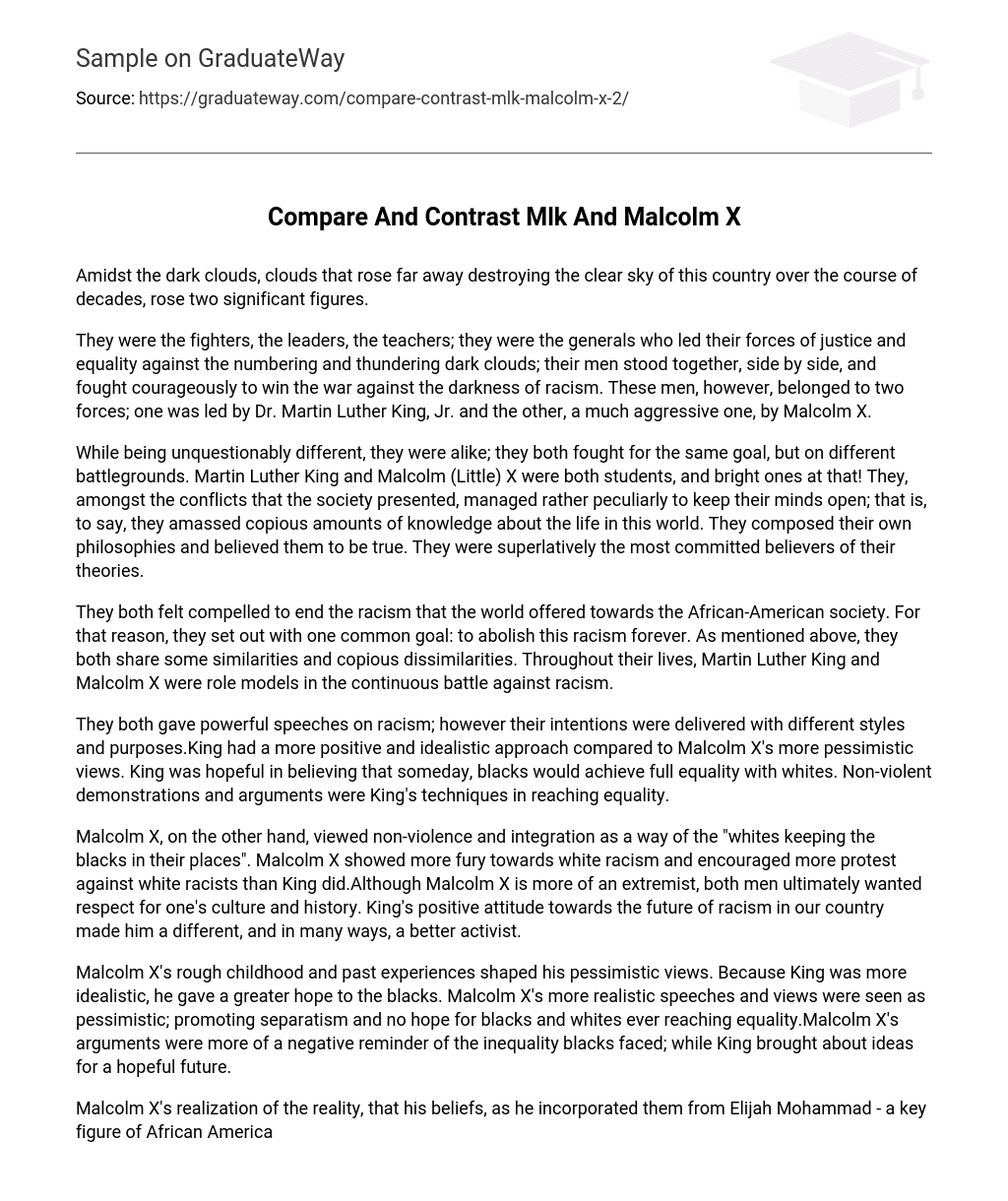Within the dark clouds, which had emerged from a distant place and gradually obliterated the once clear sky of this nation over many years, two important individuals emerged.
They were the fighters, the leaders, the teachers – the generals who led their forces of justice and equality against the numbering and thundering dark clouds. Their men stood together, side by side, and fought courageously to win the war against racism’s darkness. However, these men belonged to two distinct forces: one under Dr. Martin Luther King Jr.’s guidance and a more assertive force led by Malcolm X.
While they had distinct differences, Martin Luther King and Malcolm (Little) X shared a common dedication to a shared objective, albeit in different arenas. Both individuals were diligent learners who, despite encountering societal conflicts, maintained an open mindset. They actively pursued understanding of the world and formulated their own personal philosophies that they held as truths. Furthermore, both exhibited unwavering commitment to their respective ideologies.
They were both driven to eradicate the racism experienced by the African-American community in the world. With this shared objective, they embarked on a mission to abolish racism permanently. While they had some similarities and numerous differences, Martin Luther King and Malcolm X were both influential figures in the ongoing fight against racism throughout their lives.
Both leaders delivered powerful speeches on racism, but their intentions and styles differed. King adopted a more positive and idealistic approach, whereas Malcolm X expressed more pessimistic views. King remained hopeful, believing that someday blacks would achieve full equality with whites. He employed non-violent demonstrations and arguments as his strategies to attain equality.
Malcolm X, on the contrary, perceived non-violence and integration as means for the “whites maintaining the blacks in their designated positions”. Malcolm X expressed more anger towards white racism and advocated for more protests against white racists compared to King. Despite being more extreme, both men aimed for recognition of one’s culture and history. King’s optimistic outlook on the future of racism in our nation distinguished him as a distinct and superior activist in many aspects.
Malcolm X’s challenging upbringing and personal history influenced his pessimistic perspective. In contrast, King’s idealistic outlook provided greater optimism for black individuals. Malcolm X’s realistic speeches and viewpoints were frequently perceived as pessimistic, as they advocated for segregation and expressed doubt about the possibility of ever achieving equality for both blacks and whites. His arguments served as a constant reminder of the inequality faced by black individuals, while King offered ideas and visions for a future filled with hope.
Malcolm X came to the realization that his beliefs, which he had adopted from Elijah Mohammad, a prominent figure in the African American Muslim society known as the Nation of Islam, were incorrect. The Nation of Islam organized numerous events against the Caucasian race and employed illegal tactics in secret to promote the idea of racial separation between blacks and whites. However, after embarking on a pilgrimage to Mecca, a holy city for Muslims, Malcolm X discovered that Islam actually teaches racial equality rather than inequality. On the other hand, Dr. King remained steadfast in his belief that blacks and whites are equal and that one day this equality would be recognized worldwide.
King never had to alter his convictions, in contrast Malcolm X’s frequent display of anger provided ammunition for white racists. King was a stronger advocate for non-violence, resulting in fewer criticisms from white individuals. Malcolm was more susceptible to attacks from whites due to his anger.
Malcolm X’s anger also generated more animosity within the black community. It might have been more successful if he had expressed his ideas in a manner more resembling King’s. Nonetheless, Malcolm X and Martin Luther King were both highly influential figures from our past. They shared the ultimate objective of instilling hope in the African American population in our nation; however, they approached this goal with distinct ideologies.
King’s optimistic approach towards giving hope to African-Americans was more successful. Without King’s idealism, the African American vision for their future might not have been acknowledged. He provided the community with a powerful voice and a promising future to anticipate. Malcolm X’s perspectives, on the other hand, were perceived as leading towards a segregated nation, which was less motivating for African-Americans.
Ultimately, he ultimately changed his views and fought to present them differently towards the end of his career. Despite the painful fact that hostile bullets took these important figures away from us, the newer generation, their teachings remain intact. The above explanation unmistakably showcases the impact of Dr. Martin Luther King Jr.
Although Thomas Jefferson and Malcolm X had similarities and differences, their common goal was evident: to eradicate racism against African Americans. Their efforts in achieving this objective will forever be honored.





